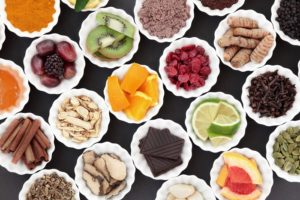Nutrition for Anxiety: Foods to Eat and Avoid

Research on the role of nutrition in fighting anxiety is mixed, but studies consistently find people with anxiety may have lower quality diets that are low in fruits and vegetables and high in fats and sugars. Emerging research also suggests some foods may help regulate neurotransmitters, thereby improving brain health and potentially reducing anxiety.
Dietary changes are not magic, and a few nutritional tweaks are unlikely to correct serious anxiety or the lingering effects of trauma. They may, however, supplement the effects of therapy, medication, lifestyle changes, and other strategies. Diet changes may also help alleviate some of the physical effects of anxiety, such as muscle tension and a racing heart.
Experimenting with a different diet can help people with anxiety feel an increased sense of control and self-efficacy. Many people with anxiety struggle with feeling out of control. Proactive measures to fight anxiety may help with this feeling. Be open to experimentation, and know that it can take time to realize the anxiety-fighting benefits of anti-anxiety foods.
The Science Behind Foods That Reduce Anxiety
Nutrition affects anxiety in both direct and indirect ways. Low blood glucose can be an anxiety trigger, so crash diets and prolonged periods without food may make anxiety worse. Sugary foods, caffeine, and alcohol can also trigger or exacerbate anxiety. People struggling with anxiety may wish to cut back on these ingredients or eliminate them altogether.
Experimenting with a different diet can help people with anxiety feel an increased sense of control and self-efficacy.
Certain foods may also reduce anxiety. There’s no single mechanism through which food reduces anxiety. Each anxiety-friendly food boasts its own unique benefits. Some common features include:
- Promoting general health. Some evidence suggests that simply eating a more balanced, nutrient-dense diet can help with anxiety. For example, some people report reductions in anxiety when they eat a whole foods diet or when they correct nutritional deficits.
- Neurotransmitter regulation. Certain chemicals, particularly eicosapentaenoic acid (EPA) and docosehexaenoic acid (DHA) may help regulate neurotransmitters, which are brain chemicals that help carry messages across a synapse. Many anti-anxiety and antidepressant medications also work on neurotransmitters.
- Vitamin D. Vitamin D deficiency is common, especially among seniors and those who do not spend much time in natural sunlight. Vitamin D supports healthy brain function and may regulate neurotransmitters. Doctors think it may be especially critical for regulating dopamine, a brain chemical that plays important roles in motivation and pleasure.
- Fighting inflammation. Inflammation is the body’s natural response to an injury. Chronic inflammation, however, can cause a wide range of maladies. Some research links it to anxiety. Foods that fight inflammation may help with anxiety as well as other chronic health problems.
8 Best Foods for Anxiety
The best foods for anxiety are rich in nutrients, tasty, and adaptable to a wide range of diets. This ensures that even if they don’t immediately help with anxiety, they offer other health benefits. Try incorporating some of the following anxiety-reducing foods into your diet:


Salmon is rich in vitamin D, DHA, and EPA. It’s also a healthy source of protein and an excellent substitute for other meats. A 2014 study weighed the effects of salmon on men seeking inpatient mental health treatment. Men who ate salmon three times a week for 5 months had fewer symptoms of anxiety. Salmon was especially effective at alleviating physical measures of anxiety, such as a rapid pulse.
Nuts and seeds
Nuts and seeds are nutritionally dense foods that are rich in DHA. DHA is linked to improved brain health, including reductions in anxiety and better regulated neurotransmitters. Additionally, most nuts and seeds are high in selenium.
Chamomile tea is one of the world’s oldest and most popular folk remedies for insomnia. This may be due in part to its effects on anxiety. A 2009 double-blind, placebo-controlled study found that chamomile could modestly improve symptoms of generalized anxiety.
Eggs
Choline is an essential nutrient that plays a role in numerous functions, including supporting brain health, memory, and concentration. It’s also a precursor to acetylcholine. Preliminary research suggests choline deficiency may increase the risk of anxiety. Many vegetarians are deficient in choline, since the primary sources of this important nutrient are all meats. Eggs offer a viable alternative. Consider incorporating one or two hard-boiled eggs into your diet for a protein-packed source of this important nutrient.
Dark chocolate is rich in antioxidants that can fight inflammation. It’s also a healthy substitute for milk chocolate and other sugary snacks. A 2012 study found that regular consumption of dark chocolate was associated with a decrease in biochemical measures of stress, such as cortisol production. For some people, dark chocolate can also be a powerful comfort food that eases stress after a difficult day.
Berries and citrus fruits
Inflammation may be a culprit in anxiety. Inflammation can also trigger other health issues, such as chronic pain and autoimmune disorders. These conditions can intensify anxiety. Fruits that contain antioxidants may help reduce chronic inflammation. Berries, especially blueberries, are high in anti-inflammatory ingredients. Citrus fruits are a rich source of the antioxidant vitamin C.
Turmeric has long been used in herbal medicine. Emerging research suggests it may play a role in general brain health, perhaps by fighting inflammation. A 2015 study found significant reductions in anxiety scores among people who consumed turmeric.
Dairy products
Most dairy products are fortified with vitamin D. For people who do not get enough vitamin D in the diet or who spend little time outdoors, vitamin D supplementation can ease anxiety. Dairy is also a rich source of protein. Particularly for people who do not eat meat, dairy consumption may ensure adequate protein intake. Protein helps the body produce key neurotransmitters, potentially improving mood and reducing anxiety.
Every person is different. The ideal diet for one person can prove catastrophic for another. Foods that ease anxiety in some people may make it worse than others. For example, a 2015 case study details how fish oil supplements made anxiety and insomnia worse following treatment of depression.
It’s important to consult with a doctor or mental health provider who is knowledgeable about nutrition and up-to-date on recent nutritional research.
Even with expert advice, some people find their anxiety makes it difficult to adopt a healthy lifestyle or change their diet. The right therapist can help people overcome anxiety and make healthy diet and lifestyle changes. Therapy also supports people in understanding their anxiety, managing the lingering effects of trauma, and improving their quality of life. To find your therapist, click here.
References:
- Amsterdam, J. D., Li, Y., Soeller, I., Rockwell, K., Mao, J. J., & Shults, J. (2009). A randomized, double-blind, placebo-controlled trial of oral Matricaria recutita (chamomile) extract therapy for generalized anxiety disorder. Journal of Clinical Psychopharmacology, 29(4), 378-382. doi: 10.1097/JCP.0b013e3181ac935c
- Bjelland, I., Tell, G. S., Vollset, S. E., Konstantinova, S., & Ueland, P. M. (2009). Choline in anxiety and depression: The Hordaland Health Study. The American Journal of Clinical Nutrition, 90(4), 1056-1060. Retrieved from https://academic.oup.com/ajcn/article/90/4/1056/4596992
- Blanchard, L. B., & Mccarter, G. C. (2015). Insomnia and exacerbation of anxiety associated with high-EPA fish oil supplements after successful treatment of depression. Oxford Medical Case Reports, 2015(3), 244-245. doi: 10.1093/omcr/omv024
- Cui, X., Gooch, H., Groves, N. J., Sah, P., Burne, T. H., Eyles, D. W., & Mcgrath, J. J. (2015). Vitamin D and the brain: Key questions for future research. The Journal of Steroid Biochemistry and Molecular Biology, 148, 305-309. doi: 10.1016/j.jsbmb.2014.11.004
- Dyall, S. C. (2015). Long-chain omega-3 fatty acids and the brain: A review of the independent and shared effects of EPA, DPA and DHA. Frontiers in Aging Neuroscience, 7, 52. doi: 10.3389/fnagi.2015.00052
- Esmaily, H., Sahebkar, A., Iranshahi, M., Ganjali, S., Mohammadi, A., Ferns, G., & Ghayour-Mobarhan, M. (2015). An investigation of the effects of curcumin on anxiety and depression in obese individuals: A randomized controlled trial. Chinese Journal of Integrative Medicine, 21(5), 332-338. Retrieved from https://link.springer.com/article/10.1007/s11655-015-2160-z
- Hansen, A., Olson, G., Dahl, L., Thornton, D., Grung, B., Graff, I., . . . Thayer, J. (2014). Reduced anxiety in forensic inpatients after a long-term intervention with Atlantic salmon. Nutrients, 6(12), 5405-5418. doi: 10.3390/nu6125405
- Martin, F. J., Antille, N., Rezzi, S., & Kochhar, S. (2012). Everyday eating experiences of chocolate and non-chocolate snacks impact postprandial anxiety, energy and emotional states. Nutrients, 4(6), 554-567. doi: 10.3390/nu4060554
- Murphy, M., & Mercer, J. G. (2013). Diet-regulated anxiety. International Journal of Endocrinology, 2013, 1-9. doi: 10.1155/2013/701967
- Naidoo, U. (2018, March 14). Eating well to help manage anxiety: Your questions answered. Retrieved from https://www.health.harvard.edu/blog/eating-well-to-help-manage-anxiety-your-questions-answered-2018031413460
- Salim, S., Chugh, G., & Asghar, M. (2012). Inflammation in anxiety. Advances in Protein Chemistry and Structural Biology, 88, 1-25. doi: 10.1016/b978-0-12-398314-5.00001-5
The preceding article was solely written by the author named above. Any views and opinions expressed are not necessarily shared by GoodTherapy.org.